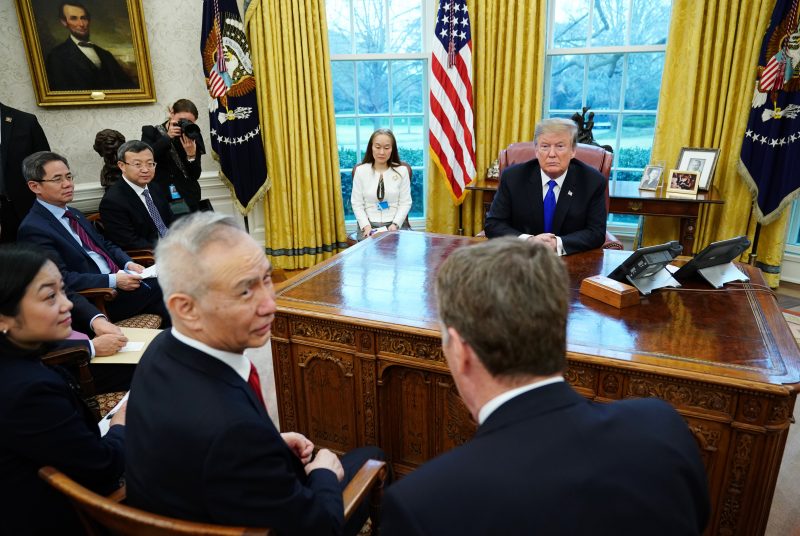Trump plays hardball with China ahead of key talks
US President Donald Trump accused China of trying to ‘renegotiate’ a trade deal that officials had said was near to completion (MANDEL NGAN)
Washington (AFP) – US President Donald Trump decided to play hardball with Beijing ahead of a key round of negotiations this week, threatening to impose tariffs on all of the $550 billion in Chinese goods imports.
The threat tanked stock markets worldwide and frightened US farmers and businesses caught in the crossfire who have been banking on a resolution to the year-long conflict.
The Dow Jones Industrial Average plunged 1.6 percent at the open — a loss of just under 400 points — before recovering some losses, reflecting the market concern over a trade war that could undermine business prospects even further.
Comments from officials in recent weeks indicated the sides were making progress towards an agreement aimed at addressing longstanding concerns about the forced transfer or outright theft of American technology, as well as reducing the US trade deficit with the world’s second largest economy.
But after his weekend threats — which prompted reports the Chinese might cancel the talks in Washington due to begin on Wednesday — Trump remained defiant.
“The United States has been losing, for many years, 600 to 800 Billion Dollars a year on Trade. With China we lose 500 Billion Dollars,” he said on Twitter on Monday. “Sorry, we’re not going to be doing that anymore!”
Trump has continued to equate the US trade deficit as a loss or as payments to trading partners, and tariffs as payments from the offending country to the United States.
Economists stress that it is American businesses and consumers who pay the tariffs and are hurt by higher prices.
– Restrained growth –
US manufacturers and farmers were becoming more optimistic amid signs of progress and comments from officials that the talks were entering their final phase.
The hope was that tariffs and counter-tariffs on a total of $360 billion in two-way trade would be lifted, helping farmers and manufacturers who had suffered in the trade war.
But Trump in a Twitter screed on Sunday accused China of trying to “renegotiate” the trade deal, threatened to more than double the existing tariffs to 25 percent from the current 10 percent, and then extend the higher tariffs to the remaining goods that had been spared so far.
Trump credited the tariffs with the strong first quarter growth but economists and businesses have complained that the trade conflict is in fact hurting the bottom line and the uncertainty is causing them to delay investment.
“We know, however, that the US tariffs are ultimately borne by US consumers and businesses facing higher input costs,” said Gregory Daco of Oxford Economics.
“What is more, the US economic performance of late has been restrained, not facilitated, by tariffs.”
And escalating the tariffs to the remaining Chinese goods, which would be expected to spark further retaliation from Beijing, would cut 0.3 percentage points off US growth, according to Oxford Economics.
Despite Trump’s tweetstorm, Chinese Foreign Ministry spokesman Geng Shuang said a Chinese team was “currently preparing to go to the US for negotiations” — but he did not say when or whether top negotiator Liu He would lead the delegation.
Geng said “positive progress” had been made in 10 rounds of high-level negotiations and that the whole world was watching.
“We still hope that the US can work together with China, walk shoulder to shoulder and strive for a mutually beneficial win-win agreement on the basis of mutual respect,” he said at a regular media briefing.
Disclaimer: Validity of the above story is for 7 Days from original date of publishing. Source: AFP.


